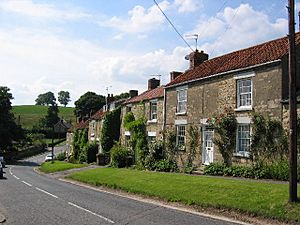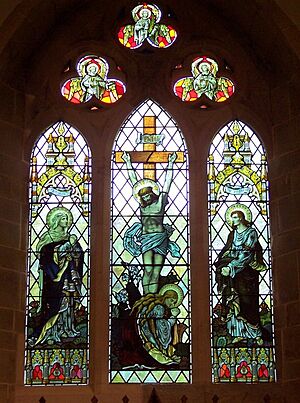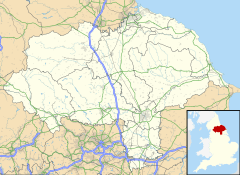Ampleforth facts for kids
Quick facts for kids Ampleforth |
|
|---|---|
 Ampleforth |
|
| Population | 1,345 (2011 census) |
| OS grid reference | SE582787 |
| Unitary authority |
|
| Ceremonial county | |
| Region | |
| Country | England |
| Sovereign state | United Kingdom |
| Post town | YORK |
| Postcode district | YO62 |
| Dialling code | 01439 |
| Police | North Yorkshire |
| Fire | North Yorkshire |
| Ambulance | Yorkshire |
| EU Parliament | Yorkshire and the Humber |
| UK Parliament |
|
Ampleforth is a village in North Yorkshire, England. It is about 20 kilometers (12 miles) north of York. The village sits near the edge of the beautiful North York Moors National Park.
In 2011, about 1,345 people lived in Ampleforth. This number includes students and staff at Ampleforth College, a well-known school. The name Ampleforth means "the ford where the sorrel grows." A "ford" is a shallow place in a river or stream that you can cross.
Contents
Village History
Ancient Discoveries
In May 2020, some amazing Roman metal objects were found near Ampleforth. These objects are called the Ryedale Roman Bronzes. They were likely used in special Roman ceremonies.
Early Records and Name Meaning
Ampleforth is mentioned in the Domesday Book. This was a huge survey of England ordered by William the Conqueror in 1086. The book said the land belonged to the Archbishop of York. The name Ampleforth comes from old English words. Ampere means "sorrel" (a plant), and ford means "a place to cross water."
Village Growth Over Time
For a long time, Ampleforth was mainly houses along one main road. Some of these buildings, like the village shop, are from the 1800s. After World War II, the village started to grow. More houses were built to the south and east. New homes are still being built today.
Places of Worship and Schools
St Hilda's Church

St Hilda's Church, Ampleforth is the local Church of England church. It is named after St Hilda, a famous English abbess. She founded Whitby Abbey a long time ago. Parts of St Hilda's Church date back to the 1200s. Some parts might even be from Saxon times!
A primary school is connected to St Hilda's Church. It is run by the Church of England and the local council.
Ampleforth Abbey and St Benedict's Church
Ampleforth Abbey is a large monastery just 1.5 kilometers (1 mile) from the village. The monks from the Abbey serve Our Lady and St Benedict's Church, Ampleforth. This church has been the Catholic parish church for the village for many years.
There is also a Catholic primary school called St Benedict's. It is a co-educational school, meaning both boys and girls attend.
Local Life and Traditions
Village Pubs
Ampleforth has two traditional pubs: the White Swan and the White Horse. The White Horse pub is named after a huge white horse shape. This shape is carved into a nearby hillside.
Quaker Settlement
There used to be a Quaker community near Ampleforth. Quakers are a religious group. In the 16th century, a farm called Carr House Farm was used by flax workers. They would weave flax into linen fabric there.
Ampleforth Sword Dance
The village was once famous for the Ampleforth Sword Dance. This traditional dance was performed at Christmas. It was a "Long Sword" dance. The story of the dance was about a traveler who was "killed" by six dancers with swords. Then, a clown would magically bring the traveler back to life!
A man named Cecil Sharp wrote about this dance. He found the last person who had performed as the clown in the dance.
Old Railway Station
Ampleforth used to have its own railway station. It was about 2.4 kilometers (1.5 miles) south of the village. Trains ran between York and Pickering from the 1930s. The station closed in 1950.
How the Village is Run
Ampleforth is part of North Yorkshire Council. This council manages local services for the area. Before 2023, the village was part of the Ryedale district.
See also
 In Spanish: Ampleforth para niños
In Spanish: Ampleforth para niños
 | DeHart Hubbard |
 | Wilma Rudolph |
 | Jesse Owens |
 | Jackie Joyner-Kersee |
 | Major Taylor |


